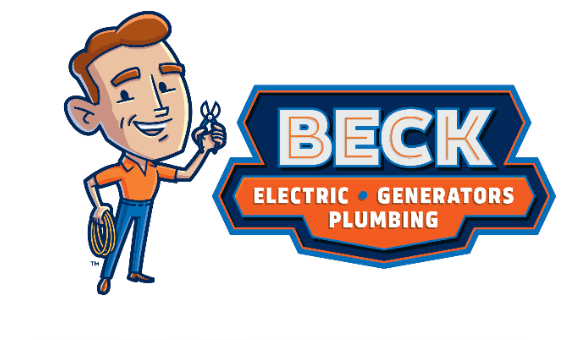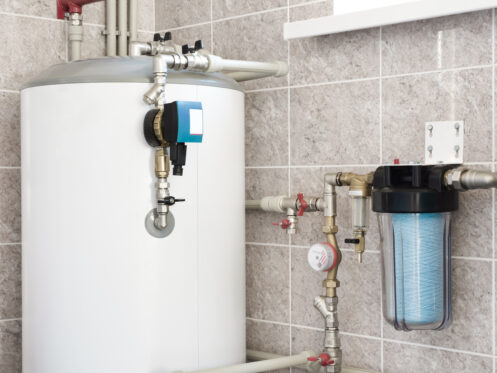On average, you should expect your water heater to last between 10 and 15 years. Larger tanks that are 50 gallons or larger, may last up to 20 years. However, many factors will influence the life expectancy of a hot water tank, including where you live, the condition of the water that you’re using, and how well you maintain your water heater.
How Water Heaters Work
A water heater has a heating mechanism that produces hot water used in homes. Normally, it functions seamlessly regardless of whether it’s a gas or electric water heater, albeit with a few small differences.
The Tank
Most water heaters in the United States feature a large, insulated tank that stores hot water. Water tanks vary in size, ranging from 20 to 80 gallons, and correspond to the size of the house and the number of occupants requiring hot water. The average water heater capacity that many homeowners choose in the United States falls between 40 and 60 gallons.
The Dip Tube
Cold water from the city’s water supply, a well, or the home’s water source enters the tank through the dip tube. This tube directs cold water from the main valve through the cold-water service line. When hot water is needed, it flows through the dip tube into the tank and exits via the hot water service line. The dip tube at the top of the tank connects to the city’s cold water supply.
The Heating Element
An electric water heater’s heating element is positioned at the tank’s bottom, while a gas water heater’s burner is located near the same location.
An anode rod within the tank prevents rusting through electrolysis. This safety measure ensures that the rod, typically made of aluminum, zinc, or magnesium-coated steel, corrodes instead of the tank’s interior.
The Thermostat
The thermostat allows users to measure and adjust the water temperature.
The Outlet Pipe
This pipe transports hot water from the tank to the hot-water service line.
How It All Functions Together
Water enters the home through the main water line, which divides into two paths. One path directs cold water, while the other leads to the water heater. A heating mechanism at the tank’s bottom warms the water according to the thermostat settings. As cold water enters, it descends to the tank’s bottom, while hot water rises to the top. When a hot water valve is opened, pressurized hot water from the heater travels through the outlet pipe and into the home’s hot water plumbing system.
What Is a Tankless Water Heater?
Tankless water heaters heat water instantaneously on demand and don’t have a storage tank. When the hot water faucet is turned on, cold water travels directly to the unit’s heat exchanger, where it is rapidly heated using either an electric element, natural gas, or propane fuel. This design allows tankless water heaters to provide a continuous flow of hot water, eliminating the need to wait for a storage tank to fill up.
However, there are limitations to the flow rate of tankless water heaters. Typically, they can deliver between 2 and 5 gallons of water per minute, with gas-heated units offering slightly higher flow rates. Nevertheless, even the largest gas-heated tankless water heater may struggle to produce sufficient hot water for multiple hot water fixtures to be used simultaneously, such as taking a shower while doing laundry.
Some homeowners have addressed this issue by installing multiple tankless water heaters. However, they must consider the additional expense of each unit when determining if this solution is suitable for meeting their needs.
Enhancing the Lifecycle of a Water Heater
Most homeowners endeavor to postpone the purchase of a new water heater until it becomes the last resort. However, there are several measures homeowners can implement to prolong the lifespan of their water heater.
Installation of an Expansion Tank
As the water heats up, it expands, increasing pressure inside the tank. Without an expansion tank, this pressurized water has nowhere to go, raising the risk of the tank bursting or failing over time. An expansion tank enables the extraction of some pressurized water from the tank, thereby reducing internal pressure and mitigating potential damage.
Regular Maintenance Is Key
Regular maintenance by a professional plumber is crucial for extending the lifespan of a water heater. During these maintenance sessions, plumbing professionals can identify and address issues with the heater’s components before they escalate into major problems.
Maintenance for gas-heated water heaters includes inspecting the gas line for cracks, rust, or leaks. If any issues are detected, prompt repairs are conducted. Plumbing professionals also examine the pressure release valve to ensure it functions correctly, preventing the heater from being over pressurized, which can lead to catastrophic failures.
Sediment buildup can decrease water heater efficiency and shorten its lifespan. During maintenance, plumbers flush out sediment from the bottom of the heater, maximizing heat transfer from the burner or heating element to the water.
Furthermore, plumbers inspect the anode rod during maintenance. If the rod is more than 50% covered in calcium or shows signs of corrosion, replacement may be recommended to maintain the heater’s functionality and longevity.
Insulate Piping
Insulation should be installed around the pipes and around the water heater itself. A plumber can provide you with insulation that is right for the length and diameter of the pipe. Insulation should be used on both the hot-water and cold-water pipes.
Setting the Temperature
It’s easy to set the temperature on your water heater. However, if you’re away from home for a long time, you might want to adjust the temperature before you leave. Lowering the temperature to its lowest setting when you’re away for a long time will help reduce energy costs and the tear on the unit, thus increasing its life cycle.
Indications It’s Time to Replace Your Water Heater
Cold Water
If your water heater is on but only cold water is coming out of the faucet, it’s a clear sign that something is amiss, and it may be time for a replacement.
Rumbling Noises
Rumbling sounds emanating from your water heater tank could indicate sediment buildup, which causes the heater to work less efficiently. While some cases may be remedied with repairs, severe buildup may necessitate replacing the unit entirely.
Moisture Presence
The presence of moisture around the water heater may indicate a leak. Any significant leaks should be addressed promptly, often requiring a unit replacement.
Rust in Water
Tinted or rusted water flowing from the water heater could signify rusting pipes. A professional plumber can assess your system to determine if internal tank rusting warrants replacing the unit.
Top Commercial and Residential Plumbers and Electricians in Canton, Ohio
When you need residential or commercial electricians and plumbers in Canton, Ohio, contact us at Beck Electric, Generators & Plumbing. We have been operating since 2007. Our reliable service has led to us receiving several awards and certifications. We are part of the National Electrical Contractors Association and are Better Business Bureau accredited.
Our services include general residential and commercial electrical repairs, maintenance, and installations. Our plumbing services include boilers, sump pumps, general repair, installation, and maintenance. Contact Beck Electric, Generators & Plumbing today to schedule an appointment.






